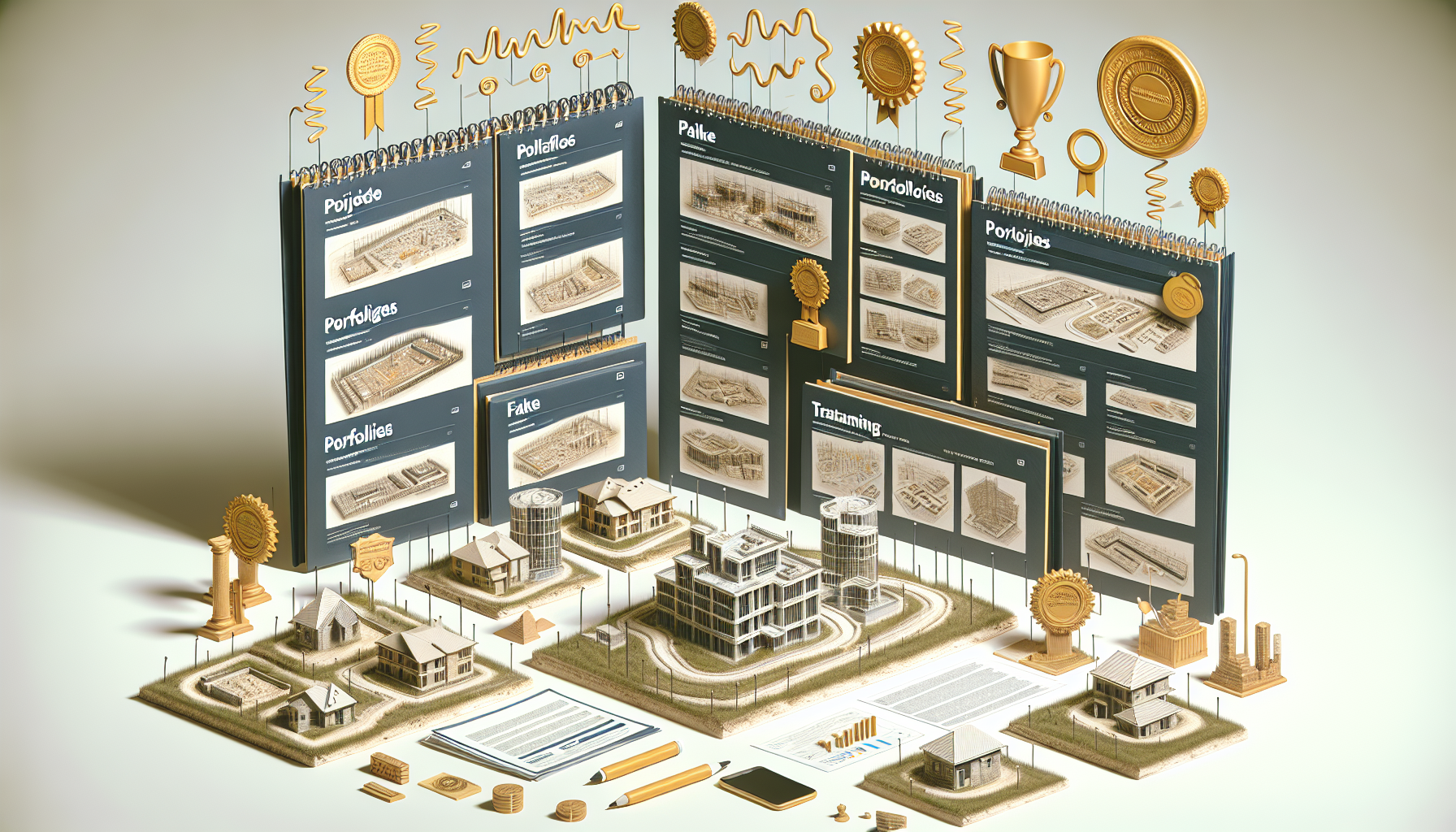Top Construction Websites: Elevate Your Construction Business
Navigating the world of construction websites can be daunting whether you’re looking to build a new site or improve an existing one. We will dive straight into the core elements that differentiate the best construction websites from the rest. Expect actionable tips to revamp your site with a strong focus on user experience, SEO, and showcasing your portfolio to capture and retain your target audience.
Construction Website Design
Essential Elements of an Effective Construction Website

In the bustling world of construction, a website serves as the digital storefront for your business. A well-crafted construction website not only illustrates your craftsmanship but also becomes a pivotal touchpoint for engaging potential clients. It is the synergy of easy navigation, high-quality images, and engaging content that transforms a basic website into one of the best construction websites, setting the stage for a great website experience that resonates with website visitors and positions your construction business website as a beacon of construction management excellence.
Easy Navigation
Effortless navigation is the cornerstone of a user-friendly construction website. It’s the dedicated team behind the web design that forges a path for website visitors to explore your services with ease. From the home page to the detailed pages of your construction projects, the navigation should serve as a clear map, guiding visitors through a journey that is not only visually appealing but also encapsulates the safety and functionality of good construction practices.
High-Quality Images
They say a picture is worth a thousand words, and in the construction industry, high-quality images, including high quality photos, speak volumes. These images are the cutting edge of your portfolio, offering a glimpse into the quality and reliability of your projects. High-quality photography does more than create a visually appealing web presence; it showcases the intricate details of your work and reinforces your brand’s credibility to potential clients.
Moreover, optimizing these images for SEO is a strategic step towards commanding greater visibility and engagement online.
Engaging Content
Content that captivates and educates is a powerful tool in the arsenal of any construction website. Engaging content not only demonstrates your deep industry knowledge but also kindles interest and creates an emotional connection with your audience.
Whether it’s detailing your array of services, from custom home builds to renovations, or weaving sales components into your project presentations, the right words can turn website visitors into lifelong patrons for a business owner.
Construction Web Design

A construction website is a canvas where your past projects take center stage, telling stories of success and expertise. It’s where potential clients go to envision their future through the lens of your completed works. An effective showcase leverages a minimalist and modern design, bright images, and clear calls-to-action, inviting visitors to delve deeper into your portfolio and engage with the award-winning projects you’ve brought to life.
Organized Portfolio
An organized portfolio is the gallery of your achievements. It is here that your past projects, categorized by type—residential, government, or aviation—display your specialization and the breadth of your capabilities.
Websites like that of Harper Construction Company and Joel & Co. Construction serve as exemplars, demonstrating how a clean, elegant presentation with a well-structured photo slideshow can effectively captivate and attract new business.
Project Details
The devil is in the details, and when it comes to showcasing your projects, more is more. Detailed descriptions of your past projects do not just engage visitors; they influence purchasing decisions and enhance your search engine presence.
Case studies and maps that display the locations of your projects underscore your geographical reach and experience, while also reflecting the company’s unique approach and problem-solving capabilities.
Customer Testimonials
Nothing quite builds trust like the voice of a satisfied customer. Customer testimonials are the currency of credibility, offering potential clients a glimpse into the success and satisfaction you deliver. Integrating these testimonials with showcases of completed projects not only reinforces your company’s credibility but also highlights your unique selling propositions, directly influencing sales and fostering consumer confidence.
Construction Management Tools Integration

In the realm of construction, where every second and every decision can impact the outcome of a project, the integration of construction management tools into your website can be a game-changer. Platforms like Aptix offer the following benefits:
These tools can greatly improve the efficiency and effectiveness of your construction projects.
Scheduling and Collaboration
The threads of scheduling and collaboration are woven into the fabric of successful construction management. Tools that facilitate real-time collaboration and adherence to project schedules are not just a luxury but a necessity. The integration of such tools on your construction website can significantly uplift project management, fostering a culture of efficiency and unity among well-integrated teams that are more likely to meet their targets.
Document Sharing and Storage
In a digital age, the ability to share and store documents on your construction website is tantamount to unlocking a trove of productivity and security. With round-the-clock access to crucial project documents, cloud storage solutions offer both cost savings and enhanced protection against unauthorized access, while enabling the collaborative sharing of large files like CAD models and ensuring version control, pivotal for any construction project.
Optimizing Your Construction Website for SEO

In the vast expanse of the internet, standing out is not just about being different; it’s about being discoverable. SEO is the beacon that guides potential clients to your construction website amidst a sea of competitors. With strategic optimization, from the server you choose to host your website to the content that graces your pages, you can improve your digital visibility and draw the attention of those looking for the construction services you provide.
Keyword Research
The bedrock of any SEO strategy lies in keyword research. It’s the process of uncovering the phrases and terms that your potential clients use when searching for your services. By identifying these keywords, like ‘construction services california’, and mapping them to specific pages on your construction website, you create a blueprint for your content that can elevate your search rankings and make your website a magnet for relevant traffic.
On-Page Optimization
On-page optimization is the art of fine-tuning your website’s elements to sing in harmony with search engine algorithms. Meta tags, header tags, and strategic keyword placement work in concert to not only organize your content but also signal its relevance to search engines. This meticulous orchestration helps your construction website climb the search engine rankings, ensuring that when potential clients search for construction services, your website is prominently displayed.
Local SEO
Local SEO is your construction company’s compass, directing local search traffic to your doorstep. By embedding your location within your website’s keywords, you not only increase specificity but also carve out a niche in the local market, establishing your construction business as the go-to expert in the area. This targeted approach is essential in a field where local knowledge and presence are as much a part of your offering as the quality of your construction work.
Utilizing Social Media and Digital Marketing

As we continue to navigate the digital era, social media and digital marketing emerge as powerful conduits for construction companies to expand their reach. These platforms are not just about building an online presence; they’re about constructing relationships, fostering engagement, and driving website traffic.
In fact, a significant portion of construction companies have reported increased brand awareness and website traffic as a direct result of their social media efforts.
Social Media Platforms
Choosing the right social media platform is akin to selecting the right tool for a job. For construction companies, platforms like:
Small business owners offer unique opportunities to showcase their brand, connect with communities, share expertise, and weave engaging stories.
From posting timelapse videos on YouTube to sharing design inspirations on Pinterest, each platform provides a distinct way to engage with audiences and drive traffic back to your construction website.
Content Marketing
Content marketing is an art form that, when mastered, can generate leads and build lasting relationships with your audience. This strategic approach to online presence is about engaging your target audience throughout their journey—from raising awareness to encouraging the final decision to choose your construction services.
By sharing captivating content such as before-and-after photos and informative Q&A sessions, you invite increased engagement and drive traffic that is vital for your construction business’s growth.
Email Marketing
Email marketing is a powerful channel that allows construction companies to maintain connections with past clients and captivate new prospects. With personalized content that creates a sense of urgency and clarity, and through the use of drip campaigns, you can deliver messages that resonate with your audience and guide them towards actionable decisions.
This method of digital communication ensures your construction business remains top-of-mind and an active participant in your clients’ future construction ventures.
Tips for a Mobile-Friendly Construction Website
In a world where mobile devices are the primary window to the web for many, a mobile-friendly construction website is no longer optional—it’s essential. The trifecta of responsive design, fast loading times, and simplified navigation are the pillars of a mobile-friendly website, ensuring that whether your website visitors are on a job site or in an office, they have a seamless and efficient experience navigating your digital space.
Responsive Design
Responsive design is the fluid framework that allows your construction website to adapt elegantly across a myriad of screen sizes. It ensures that your high-quality images, content, and portfolio are consistently presented, regardless of whether they are viewed on a:
This level of adaptability is not only user-friendly but also a critical factor in enhancing your website’s search rankings, particularly for local searches on mobile devices.
Fast Loading Times
Speed is of the essence, and when it comes to your construction website, fast loading times are imperative. The quicker your site loads, the better the user experience, leading to higher conversion rates and lower bounce rates.
Optimized loading times, especially on mobile devices, also contribute to improved search engine rankings, ensuring that your website is not only found but also enjoyed by your visitors.
Simplified Navigation
Simplified navigation is the compass that guides your mobile users through your website with ease. By ensuring that your menus are well-organized and contact buttons are within easy reach, you cater to the user’s need for quick and efficient access to necessary information.
Testing your website’s navigability with real users provides invaluable insights into its usability, ensuring that your mobile site is as functional and user-friendly as possible.
Frequently Asked Questions
A well-crafted FAQ section is like a knowledgeable guide, ready to address the curiosities and concerns of your prospects. It is a testament to your transparency and your dedication to assist potential clients. By answering common questions about:
You not only demonstrate your company’s expertise but also build a bridge of trust with your website visitors, showcasing your readiness to address their needs and reinforce your commitment to exceptional service.
Contact Contractor Rhino for your Construction Website
As the blueprint of our journey comes to a close, we have navigated through the crucial elements that make a construction website not just functional but formidable. From the inviting pathways of easy navigation and the striking visuals of high-quality images to the persuasive narrative of engaging content, we’ve laid the groundwork for a digital presence that stands as strong as the buildings you construct. Integrating management tools, optimizing for SEO, leveraging social media, and ensuring mobile-friendliness are the advanced techniques that will keep your website ahead of the curve, attracting clients and building a legacy that lasts. Contact us today at
